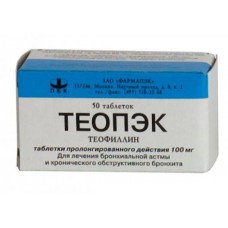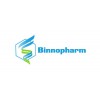Expiration date: 03/2026
Latin name: Theopecum
Release Form: Pills
Composition
1 tablet contains: Theophylline 100, 200 or 300 mg.
Excipients: The composite polymeric carrier (methacrylic acid and macrogol (polyethylene glycol) interpolymer complex), calcium stearate.
Packaging
The bank has 50 tablets. The package 1 bank.
Pharmachologic effect
Theopec (Theophylline) relates to inhibitors of phosphodiesterase.
Theophylline increases the accumulation of c-AMP tissues, which reduces the contractile activity of smooth muscle.
Theophylline extends bronchi, blood vessels (especially brain vessels, skin and kidney).
It reduces pulmonary vascular resistance, lowers blood pressure in the pulmonary circulation.
Increases renal blood flow.
It has a moderately pronounced diuretic effect.
It inhibits platelet aggregation.
It has a stimulating effect on the respiratory center, increases the frequency and force of heart contractions.
Slow release of the active substance from the tablet achieves a therapeutic blood level of theophylline in 3-5 hours after administration Theopec and maintained for 10-12 hours.
Half board taking the drug allows to obtain effective concentrations of theophylline in the blood throughout the day.
In connection with the action of the drug one of the most important indicators for use is to prevent night and daybreak phenomena of bronchospasm.
Testimony
Treatment and prevention of bronchial obstruction at:
- Bronchial asthma.
- Chronic obstructive bronchitis.
- Emphysema.
- Dermatorespiratornom syndrome.
- Other diseases of the respiratory system.
Contraindications
- Hypersensitivity (including to other xanthine derivatives - caffeine, pentoxifylline, theobromine).
- Acute myocardial infarction.
- Severe arterial hyper - or hypotension.
- Widespread atherosclerosis.
- Severe heart rhythm disorders (severe tachyarrhythmias, premature beats).
- Hyperthyroidism.
- Peptic ulcer and duodenal ulcer in the acute stage.
- Gastritis with high acidity.
- Bleeding from the gastrointestinal tract.
- Epilepsy.
- Increased seizure activity.
- Hemorrhagic stroke.
- Bleeding in the retina of the eye.
- Pregnancy.
- Children under 3 years old.
Be wary of:
- Severe angina.
- Heart failure.
- Hypertrophic cardiomyopathy.
- Expressed human liver and kidneys.
- Gastric ulcer and duodenal ulcer (history).
- Bleeding from the gastrointestinal tract in recent history.
- Prolonged hyperthermia.
- Gastroesophageal reflux.
- Hypertrophy of the prostate.
Dosing and Administration
Theopec administered orally after meals with water. The tablet is not crushed, not chewed or dissolved in water.
The daily dose is divided into 2 doses 12 hours apart.
The optimal dose is selected individually depending on the nature of the disease, age and weight of the patient.
The drug is administered 2 times a day:
- Adults and children over 14 years: 300 mg.
- Children from 7 to 12 years - 200 mg.
- Children from 3 to 7 years - 100 mg.
On the first day of treatment is initiated with half the daily dose in 2 hours.
When no side reactions are moving to complete the daily dose.
The duration of the drug depends on the characteristics of the disease and to render a therapeutic effect.
On average, the treatment course can last from 2 weeks to 2 months.
Special instructions
In severe diseases of the cardiovascular system, liver, viral infections, as well as in elderly patients the dose should be reduced.
The effectiveness of theophylline may be reduced in smokers.
Since the bronchodilator effect Theopec develops gradually over 3-6 hours after ingestion, the drug is not indicated for the relief of emergency conditions.
Be careful when consuming large amounts of caffeine-containing foods or beverages during the treatment period.
Drug interactions
Theophylline is not used in conjunction with other xanthine derivatives.
In combination with phenobarbital, phenytoin, rifampin, isoniazid, carbamazepine, sulfinpyrazone, a decrease in the effectiveness of phenytoin theophylline, which may require an increase in the applied doses of the drug.
While the use of macrolide antibiotics, lincomycin, allopurinol, cimetidine, isoprenaline, beta-blockers, oral contraceptives, epoksatsinom and vaccination against influenza may increase the intensity of the action, which may require dose reduction of theophylline.
Theophylline increases the likelihood of side effects of glucocorticoids, mineralokortikosteroidov (hypernatremia), means that excite the central nervous system (increases neurotoxicity).
The drug inhibits the therapeutic effects of lithium carbonate and beta-blockers.
Theophylline potentiates the effect of diuretics due to an increase in glomerular filtration and tubular reabsorption reduction.
Precautions theophylline administered simultaneously with an anticoagulant.
Antidiarrheal drugs and chelators reduce the absorption of theophylline.
Overdose
Symptoms: loss of appetite, gastralgia, diarrhea, nausea, vomiting (including blood), gastrointestinal bleeding, tachypnea, facial flushing, tachycardia, ventricular arrhythmia, insomnia, motor agitation, anxiety, photophobia, tremors, convulsions . In severe poisoning can develop epileptic seizures, hypoxia, metabolic acidosis, hyperglycemia, hypokalemia, lowering blood pressure, confusion, renal failure with myoglobinuria.
Treatment: removal of the drug, gastric lavage, the appointment of activated charcoal, laxative drugs, intestinal lavage combination of polyethylene glycol and electrolytes, forced diuresis, hemosorbtion, plasmasorption, hemodialysis (efficiency is not high, peritoneal dialysis is not effective), symptomatic therapy (including metoclopramide and ondansetron - vomiting). In the event of seizures, to maintain airway patency and carry oxygen therapy. For relief of an attack - in / diazepam, 0.1-0.3 mg / kg (maximum 10 mg). In severe nausea and vomiting - metoclopramide, or ondansetron (w / w).
Storage conditions
Store in a dry, dark place at a temperature no higher than 25 ° C.
Shelf life
5 years.




